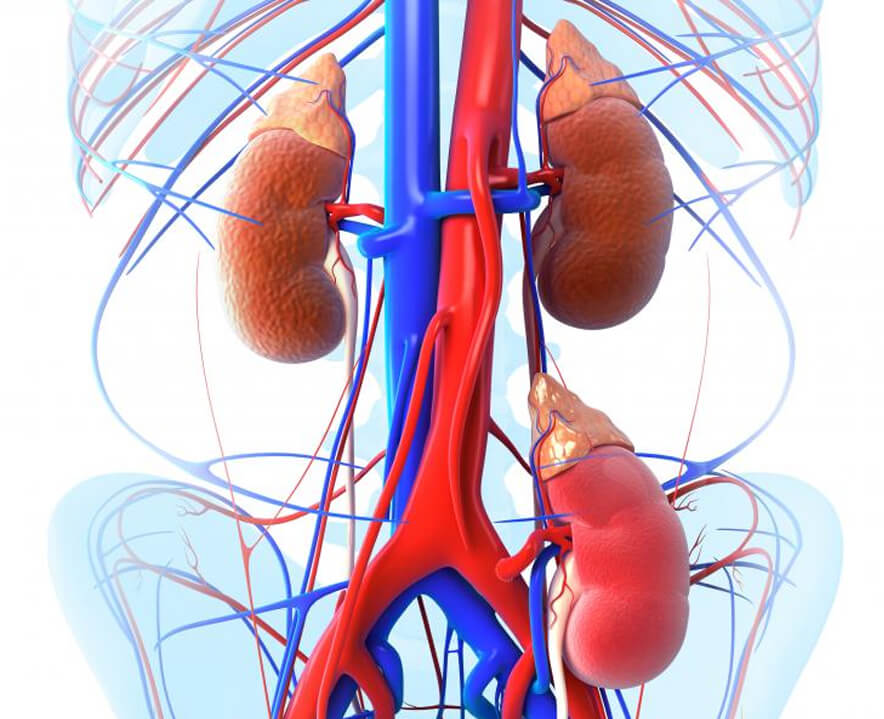Kidney Transplantation
When kidneys are unable to filter blood, harmful fluids and wastes accumulate in the body and
lead to higher blood pressure or could result in the end-stage kidney disease. It is considered
kidney failure when they have lost about 90% of functional capacity.
Some common causes of kidney damage include:
- Diabetes
- Polycystic kidney disease
- Glomerulonephritis
- Chronic, high blood pressure
When kidneys are damaged to the extent that they fail to execute blood filtration, it is
executed with medical equipment in a process called dialysis. Dialysis is a recurring blood
purification procedure which removes the waste and extra fluids build
up in the body due to kidney failure. The process is painful and is a short term solution for
the problems, hence has to be re-done at suitable intervals.
Kidney transplant, on the other hand, is a one-time solution and allows patients to have a
normal life, with more energy and fitness. Despite being a complex surgery, Kidney transplant
makes patients feel better and the survival rates of the patient are
also higher. However, patients with kidney diseases that recur invariably and damage the kidney,
diagnosed cancer, positive crossmatch or active infection cannot opt for a kidney transplant.
If the doctor feels that patient is suitable to undergo a kidney surgery, he/she would refer the
patient to a transplant center for being evaluated. The evaluation usually takes several visits
while the doctors evaluate the physical, familial and psychological
condition of the patient. The doctors run tests on patients' blood and urine accompanied by a
complete physical exam to ensure he/ she is healthy enough to undergo the surgery.
Post this an appointment with a psychologist and a social worker is scheduled. The psychologist
does his course to ensure that the patient is competent to understand and undergo a complicated
treatment procedure. The social worker ensures that the patient
can afford the treatment and has adequate support after his release from the hospital.
If approved for the transplant, either the patient's family member is allowed to donate post a
series of testings or the patient is put up on the waiting list of Organ Procurement and
Transplantation Network (OPTN).
A kidney transplant normally takes 3 to 5 hours. The patient is kept under complete anaesthesia
and once “under”, the surgeon makes an opening in the abdomen, above the groin. The old kidneys
are not removed unless causing pain or carrying the infection,
but the new kidney is put in. Its blood vessels are attached, then the surgeon connects the
ureter ( the tube that carries urine from the kidney) to the bladder. The opening in the abdomen
is then closed with stitches, staples
or special glue.A tiny pipe called the stent is entered into the ureter to help the patient pee.
This is removed 6 to 8 weeks past the surgery through a simple procedure.
It’s often possible to get off bed and walk around a day after surgery, so most of the patients
stay in hospital for 5 or less days. Although it's common to feel well 2 weeks after the
surgery, doctors often suggest 6 to 8 weeks of no driving or heavy
weight lifting. To ensure that the patient’s body does not refuse the donor’s kidney, regular
medications along with 2 to 3 doctors visits per week are prescribed. The doctor constantly
monitors if the body is healing the right
way and once things get a little normal, the frequency of doctor visits are reduced. To recover
faster, the doctors usually ask to stay active and in most cases specifically suggest a few
exercises that are safe to do. Mostly,
the start is with walking and stretching and then gradually going for long and intense workouts.
However, Contact sports is a strict no!
A kidney transplant puts the body through a massive man-made change and hence makes the body
more susceptible to health issues like diabetes or high blood pressure, infections in the area
around incision. There are also chances for the patient's body
to refuse the donor kidney. If that happens, it could lead to
- Fever
- Vomiting
- Cough
- Nausea
- Pain, mostly while peeing
- Reduced urination
It is strictly advised for the patients to monitor and consult the doctor immediately whenever
any of the above situations arise.
Blue Bliss Hospital is the best kidney transplantation hospital in Bangalore, the experienced
team of urologists and nephrologists provides advanced treatment for kidney failure,
chronic kidney diseases and kidney Surgery. Blue Bliss Hospital is located in Seshadripuram, Bengaluru
and is at a walking distance to Mantri Square Sampige Road, malleshwaram.
